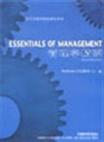管理学精要
出版时间:2004-10-01 出版社:外语教研 作者:杜布林 页数:517
内容概要
Essentials of Management, 6e provides all the key concepts and tools needed to helpyou start climbing the ladder of a successful management career. Topics were carefully se-lected and presented in a way that allows you to see their importance in today's workplace. To help you further understand and connect theory to practice, DuBrin includes the following features in every chapter:Internet Skill Building Exercise. Connect with the Web sites that will boost your understanding of management topics and issues. Every chapter contains an Internet-based skill-building exercise that will send you out to the Internet to gain valuable new insights.Self-Quizzes. These short self-assessments will give you valuable new insights about yourself as a manager in areas such as leadership, motivation, and communication. Not only will you enjoy taking the self-quizzes, you will also learn about your strengths and areas for improvement.In Action Boxes, There is no clearer connection to theory and practice than in DuBrin's "in Action" boxes. There is one Management in Action or Organization in Action insert in every chapter that highlights management theory and practice in today's workplace.End-of-Chapter Cases. Cases help you to apply management concepts by taking on the role of the decision-maker. Twenty-two cases are new to this edition.
作者简介
作者:(美国)杜布林
书籍目录
Preface导读Introduction to ManagementChapter 1 The Manager's JobChapter 2 International Management and Cultural DiversityChapter 3 Information Technology and the InternetChapter 4 Ethics and Social ResponsibilityPlanningChapter 5 Essentials of PlanningChapter 6 Problem Solving and Decision MakingChapter 7 Quantitative Techniques for Planning and Decision MakingOrganizingChapter 8 Job Design and Work SchedulesChapter 9 Organization Structure, Culture, and ChangeChapter 10 Staffing and Human Resource ManagementLeadingChapter 11 LeadershipChapter 12 MotivationChapter 13 CommunicationChapter 14 Teams, Groups, and TeamworkControllingChapter 15 Essentials of ControlChapter 16 Managing Ineffective PerformersManaging for Personal EffectivenessChapter 17 Enhancing Personal Productivity and Managing Stress Glossary Index
章节摘录
FRAMEWORK OF THE BOOKThe first four chapters present an introduction to management. Chapter 1, "The Manager's Job," explains the nature of managerial work with a particular emphasis on managerial roles and tasks. Chapter 2, "International Management and Cul-tural Diversity," describes how managers and professionals work in a multicultural environment. Chapter 3, "Information Technology and the Internet," describes how information technology, including the Internet and e-commerce, influences the manager's job. Chapter 4, "Ethics and Social Responsibility," examines the moral aspects of management.The next three chapters address the subject of planning. Chapter 5, "Essentials of Planning," presents a general framework for planning--the activity underlying almost any purposeful action taken by a manager. Chapter 6, "Problem Solving and Decision Making" explores the basics of decision making, with an emphasis on creativity and other behavioral aspects. Chapter 7, "Quantitative Techniques for Planning and Decision Making" describes several adjuncts to planning and decision making such as break-even analysis, PERT, and production-scheduling methods used for both manufacturing and services.Chapters 8-10 focus on organizing, culture, and staffing. Chapter 8, "Job Design and Work Schedules" explains how jobs are laid out and work schedules arranged to enhance productivity and customer satisfaction. Chapter 9, "Organi-zation Structure, Culture, and Change," explains how work is organized from the standpoint of the organization, how culture profoundly influences an organi-zation, and how to cope with and capitalize on change. Chapter 10, "Staffing and Human Resource Management" explains the methods by which people are brought into the organization, trained, and evaluated.The following three chapters, on leading, deal directly with the manager's role in influencing group members. Chapter 11, "Leadership," focuses on different approaches to leadership available to a manager and on the personal characteristics associated with leadership effectiveness. Chapter 12, "Motivation" describes what managers can do to increase or sustain employee effort toward achieving work goals. Chapter 13, "Communication" deals with the complex problems of accu-rately sending and receiving messages. Chapter 14, "Teams, Groups, and Team-work," explains the nature of teams and how managers can foster group members' working together cooperatively.……
图书封面
评论、评分、阅读与下载
